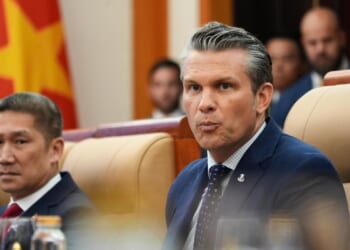The four-star admiral overseeing the military’s Southern Command — the hot spot in President Donald Trump’s war against drug trafficking — is stepping down.
Adm. Alvin Holsey announced Thursday that he is retiring from the Navy effective Dec. 12, ending a military career that started when Ronald Reagan was in the White House.
While the announcement appeared abrupt, officially at least, Holey’s separation from the service appeared cordial.
In a post published to the @Southcom account on the social media platform X, Holsey called his service an “honor” and expressed confidence that his comrades would continue to “forge ahead, focused on your mission that strengthens our nation and ensures its longevity as a beacon of freedom around the globe.”
Message from #SOUTHCOM Commander Adm. Alvin Holsey. pic.twitter.com/k0TdV49O0z
— U.S. Southern Command (@Southcom) October 16, 2025
“It’s been an honor to serve our nation, the American people and support and defend the Constitution for over 37 years,” Holsey wrote.
Secretary of War Pete Hegseth, meanwhile, used a post on the @SecWar account on X to praise Holsey’s decades of service.
“Throughout his career … Admiral Holsey has demonstrated unwavering commitment to mission, people, and nation,” Hegseth’s post stated. “His tenure as Military Deputy Commander and now Commander of United States Southern Command reflects a legacy of operational excellence and strategic vision.”
On behalf of the Department of War, we extend our deepest gratitude to Admiral Alvin Holsey for his more than 37 years of distinguished service to our nation as he plans to retire at year’s end. A native of Fort Valley, Georgia, Admiral Holsey has exemplified the highest…
— Secretary of War Pete Hegseth (@SecWar) October 16, 2025
The timing of Holsey’s departure — less than a year after he assumed command — is sure to raise eyebrows.
The U.S. is dealing with rising regional tensions with the anti-American regime of Venezuela’s President Nicolas Maduro while the U.S. military is engaged in what amounts to a running battle against drug traffickers in the Caribbean.
On Tuesday, the president posted video of the U.S. military blowing up a suspected drug trafficking vessel, killing six.
It was the fifth such strike, according to CBS News, which noted the attacks have killed 27.
The New York Times, which broke the news of Holsey’s departure, reported at least one source who claimed that Holsey “had raised concerns about the mission and the attacks on the alleged drug boats.”
The paper cited other sources who claimed that Hegseth’s praise of Holsey “masked real policy tensions concerning Venezuela that the admiral and his civilian boss were seeking to paper over.”
The newspaper also went out of its way to note that Halsey is black, and “the latest in a line of more than a dozen military leaders, many of them people of color and women, who have left their jobs this year. Most have been fired by Mr. Hegseth or pushed out.”
The report also noted that Holsey’s departure comes at a time when the “size and scope of the U.S. military buildup in the Caribbean region is significant. There are now about 10,000 U.S. troops, most of them at bases in Puerto Rico, but also some 2,200 Marines on amphibious assault ships. In all, the Navy has eight warships and a submarine in the Caribbean.”
Advertise with The Western Journal and reach millions of highly engaged readers, while supporting our work. Advertise Today.












